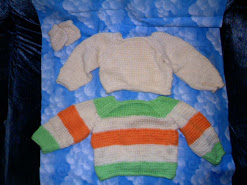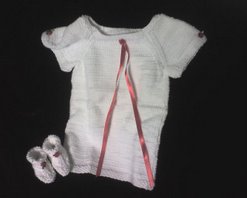
Helping Children Cope When a Loved
One Is on Military Deployment
Americans read the big, bold newspaper headlines: "U.S.
to Send New Soldiers
to Afghanistan," "Duty Calls," and "Local Guard Soldiers Headed to Iraq.
"
When these headlines refer to members of children's families and others
from the community, teachers want
to learn what they can do to help.
This article shares strategies that
teachers can use to help the children
and families of deployed men
and women who are active military
or members of reserve units.
"I don't like the Army,
Miss Allen"
The national headlines have
become reality in our midwestern
town three-and-a-half hours from
the closest active military installation,
Fort Knox, Kentucky.
One day
in May, I [Megan Allen] noticed a
change of behavior in Kayla, an
extremely social kindergartner.
She
was quiet during morning meeting,
keeping to herself when she is
usually eager to share stories about
her neighbor's puppy, her older sister's boyfriend, or her new bunk bed.
My
concern increased when she put her head down and refused to play "Slap It,"
one of her favorite word wall games.
My first thought was that Kayla was sick,
but after a visit to the nurse she returned to class with a note saying she had
no signs of illness. Nevertheless, I knew something was wrong.
Before lunch, I took Kayla aside for a private talk.
She said she was sad but
did not elaborate, so I didn't push the subject, knowing she would share
with me when she was ready.
At the end of the day, while waiting for her ride
home, Kayla was ready to talk.
Looking up with a sad face she mumbled, "I
don't like the Army, Miss Allen. It's going to take my dad away.
" At that moment,
I understood the reason for her uncharacteristic behavior that day.
Later, her
mother explained that Kayla's father's Army reserve unit was being deployed
to Afghanistan for 18 months.
This kindergartner was about to become one of
the thousands of children affected by a family member's military deployment.
Military deployment
Military deployment is a temporary assignment overseas or within the United
States (such as after Hurricane Katrina); during these assignments families
must live apart from their loved one in the service.
Whether they attend a
Department of Defense school on an overseas military base or a public school
in the U.S.
, many American children are aching for a loved one who has been
called to active duty in Afghanistan, Iraq, or elsewhere.
For many families, deployment leads to stress and uncertainty.
These stressed
families may be unaware of available resources within their community, particularly
when service members are reservists.
These families need supportive
teachers and schools.
Implications for teachers:
With the rise in military deployments, many teachers are educating emotionally
distracted children and feel ill equipped to support the special needs of
this growing population.
A kindergarten teacher whose class includes two
children with fathers deployed to Afghanistan expressed her thoughts: "I feel
helpless . . .
I have no idea what it is like to have a loved one away or [to face]
the possibility that he or she may not come home.
" The following suggestions
may help teachers support prekindergarten to primary children and families
affected by military deployments.
Supporting children emotionally
Many teachers are unfamiliar with the unique lifestyle and challenges faced
by families during military deployment.
As with other families, maintaining
open lines of communication with military families will help teachers better
understand their special circumstances.
Effective teachers know it is important
to provide emotional support to all children.
A safe and caring learning environment
is essential for children affected by deployment as it can help them
build coping skills.
Children who receive emotional support are also more likely
to maintain their academic performance even during difficult times.
Here are some suggestions for creating a supportive, stress-free learning
environment:
• Greet each child warmly every day.
A warm smile or hug as a child walks in
the door can go a long way in helping a child feel accepted and secure (Waddell
& Thomas 2004).
• Maintain consistent schedules and routines.
• Be more alert to children's behaviors, feelings, and conversations during play,
routines, and other activities, indoors and outdoors.
• Invite children to share with their classmates communications they have
received from their deployed parents.
Such communications may come via email,
letters, care packages, or video teleconferences (VTC).
Most military
units have access to phones and computers, including access to the Internet
and Web cams. This technology aids in communication.
(Be aware, however,
that not all military members and families have access to the Internet.
)
• Respect diverse family structures and living arrangements, such as children
living with grandparents.
For example, address correspondence to "Dear
Family" rather than "Dear Parent.
"
Beyond the Journal • Young Children on the Web • January 2007 3
Slight adaptations
to curriculum and
classroom structure
can help a child
continue to make
academic progress.
• Recognize and validate feelings children may experience during a deployment,
such as guilt, resentment, fear, anxiety, confusion, and anger.
A teacher
might say, "Carl, it's hard to be away from your dad.
Would you like to write
him a letter?"
• Acknowledge children's loss of time with an absent parent, and without
judgment or criticism encourage children to share their feelings and concerns
(Waddell & Thomas 2004).
• Encourage children to express their feelings through writing, drawing, roleplaying,
or performing puppet shows.
Provide time and materials for these
activities, and invite children to share their creations.
• Anticipate adjustment difficulties and carefully observe children in order to
design effective interventions.
Through observation, teachers can identify
children who are experiencing adjustment difficulties and may need additional
assistance, such as counseling.
• Be honest about or help interpret confusing information.
Teachers should tell
children the truth and help clear up misconceptions or stories from uninformed
sources, including other children.
• Be willing to say, "I don't know.
" Be careful not to provide false hope by saying
"Everything will be alright" or "I know how you feel.
" The truth is whatever
children are feeling, and the future is unknown (Waddell & Thomas 2004).
• Suggest that, before leaving home, a deployed parent record himself or herself
reading the child's favorite story or singing the child's favorite song or
lullaby.
The child can share the
recording with the class or listen to
it at bedtime (Pavlicin 2003).
The
United Through Reading program of
the Family Literacy Foundation can
assist deployed service members in
making a video of themselves reading
a story (go to
www. read2kids. org/united.htm for more information).
• Anticipate children's inability to
concentrate for long periods of time;
plan for shorter activities.
Reduce
children's workload as needed.
Be
patient and understanding when a
child's primary concern is not school
but what is going on with a deployed
parent.
• Display photos of the deployed parent
at work in uniform (Pavlicin 2003).
• Most important, make time to
listen to the children.
Supporting children through changes in the curriculum
Beyond assisting emotionally, teachers can help a child of a deployed parent
academically by making changes or additions to the curriculum.
"My teaching
definitely has to change," one second grade teacher in a public school says.
"I
need to research the country parents are deployed to so I can teach it in my
room.
" Slight adaptations to curriculum and classroom structure can help a
child continue to make academic progress.
© Laura J.
Colker
Beyond the Journal • Young Children on the Web • January 2007 4
• Integrate information on current military missions and countries in literacy,
themed essays, and stories (for children in primary grades).
• Read children's books that depict military families as main characters solving
problems and coping with stressful circumstances.
If such books are not readily
available, or as a follow-up to reading such books, the class could make their
own books. (See "Children's Books about Separation or Military Deployment.
")
• Post maps and provide globes so children can see some of the countries
where U.S.
troops are currently deployed (but remember that some military
members cannot tell their families where they are going).
Set one clock in the
classroom to the local time of parents' deployment sites.
Promote conversation
with children about activities deployed parents might be doing at certain times
throughout the day.
• Stay abreast of miltary current events by reading news articles, and watching
or listening to news programs.
Be mindful of any upsetting graphic images or
media bias concerning the military as you read, watch, and listen.
• Involve children in primary grades in age-appropriate classroom discussions
of current military and family situations, their feelings, news media reports, or
community concerns (Waddell & Thomas 2004).
Supporting caregivers at home
Family members caring for children with a deployed parent also need support.
Show them patience and understanding during this difficult time.
• Remain in frequent communication with the caregiver at home via phone
calls, e-mail, notes, and personal contacts.
• Relay information about changes in the child's behaviors at school and/or the
content of your conversations with the child concerning his or her feelings and
reaction to the parent's deployment.
• Provide all families with your home phone number and e-mail address on a
magnetic business card or in another easy-to-find format to encourage communication.
• Remind the caregiver that "it is not necessarily a parent's absence that affects
a child the most, it's how the other parent [or other caregiver at home] deals
with it" (Pavlicin 2003, 172).
Supporting parents who are deployed:
Although a service member may be deployed, he or she still desires to be an
active parent. These absent parents need support too.
• Send a copy of the class newsletter to the deployed parent.
• Document school events, field trips, and activities through videotaping,
photos, journal writing, and other means.
Digital photos and journal entries
can be sent electronically.
Maintain small photo albums of children engaged in
activities at school. Have the children decorate their albums.
• Create a class Web page with updated pictures and summaries of class activities
that all parents and other family members can view.
Make sure deployed
parents have the Web address.
• Allow the deployed parent to "watch" his/her child grow by maintaining an
updated height, size, and weight chart decorated with drawings and current
photographs.
• Record a child reading his or her favorite book, poem, or story and send the
audiotape to the deployed parent.
• Send samples of artwork, classwork,
class books, and letters to
deployed parents.
• Write and illustrate a class or
school book as a gift for a deployed
parent to share with a class or
school abroad.
Supporting a parent's return
• Post a countdown calendar in the
classroom or on the child's desk,
but remember, return dates may
change.
• Prepare a class "Welcome Home"
ban-ner when the deployed parent
returns.
• Invite the returned parent to a
class lunch and to observe his or
her child in the classroom.
• Remind families that all changes in
routine or home life can be stressful
for children, even if the changes are
happy ones, like the return of a parent from deployment.
Suggestions for schools:
Schools are the center of many communities.
Schools support the families of
their students, and military families should not be an exception.
• Plan a schoolwide American Spirit Day during which children show pride by
wearing red, white, and blue.
• Decorate school or school grounds with yellow ribbons.
• Initiate a schoolwide service project collecting materials for troops or needed
supplies for foreign schools or organizations.
(A list of acceptable materials for
troops can be found at
www. operationmilitarypride. org/packages. html.
)
• Investigate and provide information on local social services, religious organizations,
or state support efforts for military families.
• Establish military parent support groups.
• Provide children with consistent access to caring adults and counselors.
• Set up a crisis team consisting of a principal, a counselor, and a local child
psychologist.
Create a plan to deal with serious situations that may occur, such
as the injury or death of a deployed loved one.
• Establish a buddy system (buddies can be the same age or different ages) or
a support group that meets on a regular basis for children with deployed
parents.
• Be sure that school policy supports appropriate referrals for educational,
health, and social services, as needed.
Web Resources:
Military Child Education Coalition—Provides goals, best practice strategies, available teacher conferences, and
teacher suggestions and support. A membership fee may be required.
www. militarychild. orgMilitary Impacted Schools Association—Designed for schools populated with military children, it includes biographies
of military children, information on the different military branches, and best practices for the classroom.
www. militaryimpactedschoolsassociation. orgMilitary Student—Contains information, current issues, activities, and printable publications for children 6 to 13 years old,
parents, families with a child who has special needs, and military leaders.
www. militarystudent. orgNational Association of School Psychologists—Read "Parents Called to Active Duty: Helping Children Cope.
"
www. nasponline. org/resources/crisis%5Fsafety/parents-called-to-active. pdfTo share with families . . .
Deployment Link—Provides information to assist service members and their families dealing with deployments, including
family support links, activities for children, information to locate service members, and deployment benefits.
http://deploymentlink. osd. mil/deploy/family/family_support.
shtml
Military Life—Provides information related to the military family, including current events, parenting challenges, and deployment.
www. militarylife. comMoms Over Miles—Provides helpful activities and inexpensive publications for mothers and fathers to strengthen their
relationship with their children while they are away.
It also suggests a book of activities to help children stay connected
to distant parents (purchase at
http://fambooks. com/kids. htm).
www. momsovermiles. comMilitary. com—Contains facts about the five different branches of the military, recent publications, current events, and
links to various military sites.
www. military. comNational Military Family Association—Assists families through research, education, legislation, and public information.
www. nmfa. orgTalk, Listen, Connect: Helping Families During Military Deployment.
Provides bilingual resources featuring Sesame
Street characters. See especially the video about the deployment of Elmo's father.
www. sesameworkshop. org/tlc/index. phpChildren's Books
about Separation or
Military Deployment
Daddy, Will You Miss Me? by
Wendy McCormick. Illus.
by
Jennifer Eachus. 1999.
Grades K–2.
Daddy, You're My Hero! by
Michelle Ferguson-Cohen.
2002.
Grades K–1
.
The Magic Box: When Parents
Can't Be There To
Tuck You In, by Seymour
Epstein and Marty Sederman.
Illus.
by Karen Stormer
Brooks. 2003. Grades K–2.
Mommy, You're My Hero! by
Michelle Ferguson-Cohen.
2002. Grades K–2.
My Daddy Is a Soldier, by
Kirk Hilbrecht and Sharron
Hilbrecht. 2002. Grades K–1.
Soldier Mom, by Alice Mead.
1999. Grade 3.
Uncle Sam's Kids: When Duty
Calls, by Angela Sportelli-
Rehak. 2002. Grades K–3.
When Dad's at Sea, by Mindy
Pelton. Illus.
by Robert Gantt
Steele. 2004. Grades K–3.
While You Were Away, by
Eileen Spinelli. Illus.
by
Renee Graef. 2004. Pre-K–2.
A Year Without Dad, by Jodi
Brunson. Illus. by Cramer.
2003. Grades K–3.
A Yellow Ribbon for Daddy,
by Anissa Mersiowsky. Illus.
by Rey Contreras. 2005.
Grades K–3.
..





































